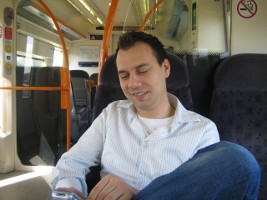A Between the Lines interview with Sebastian Fitzek
 ITW’s international membership is far-reaching and expanding. A few issues back, Between The Lines featured Peter James from Great Britain. This month, we’re moving across the English Channel to Germany for a look at Sebastian Fitzek.
ITW’s international membership is far-reaching and expanding. A few issues back, Between The Lines featured Peter James from Great Britain. This month, we’re moving across the English Channel to Germany for a look at Sebastian Fitzek.
One word comes to mind. Maverick: A lone dissenter, intellectual, artist, or politician who takes an independent stand apart from his or her associates. I think this describes Sebastian well. He’s the kind of man who will prove you wrong when you tell him he can’t do something. He lives by the same “risk versus reward” philosophy that Lee Child does.
In 1971, Sebastian was born in Berlin where he currently resides. He’s happily married to Sandra, an amazing and kind lady who’s recently given birth (10-10-10) to their daughter, Charlotte. His dog, two rabbits, and horse make up the rest of his immediate family.
He pays his taxes, shovels snow in the winter, and often uses public transportation. On the surface, he certainly doesn’t sound like a maverick. But the goal of a Between The Lines feature interview is to look deeper—to descend beneath the surface. What makes Sebastian Fitzek want to swim upstream, when floating downstream is so much easier? Why does he continue to fight and claw his way deeper into the exclusive and difficult world of thriller fiction? What drives him to keep going when so many others quit or self-publish?
 The answer is found in a single underlying force. Ambition. Sebastian refuses to accept mediocrity, it’s not in his blood. You can’t teach it and you can’t acquire it—you’re born with it. How many times have we heard someone say, “I’ve always wanted to write a book.” And yet how many of those people actually do it? Sebastian knew he wanted to be an author as soon as he was able to write his own excuse notes for missing school.
The answer is found in a single underlying force. Ambition. Sebastian refuses to accept mediocrity, it’s not in his blood. You can’t teach it and you can’t acquire it—you’re born with it. How many times have we heard someone say, “I’ve always wanted to write a book.” And yet how many of those people actually do it? Sebastian knew he wanted to be an author as soon as he was able to write his own excuse notes for missing school.
He’s impatient, nervous, and moody. On the other hand, he’s fond of animals, puts his family above all else, has a great sense of humor, and plays the drums in a band. It’s a balancing act. Writing is stressful and needs a mental outlet. There’s no need to ask Sebastian where he gets his ideas. We know where!
 Several of his stories are borderline horror genre. Think Stephen King’s MISERY meets Tom Harris’ SILENCE OF THE LAMBS. The gap between horror and thriller is often a fine line, but Sebastian’s mastery of prose betrays his age and experience. He’s an incredibly talented author who knows no limits.
Several of his stories are borderline horror genre. Think Stephen King’s MISERY meets Tom Harris’ SILENCE OF THE LAMBS. The gap between horror and thriller is often a fine line, but Sebastian’s mastery of prose betrays his age and experience. He’s an incredibly talented author who knows no limits.
Sebastian’s six freestanding novels in the order they were written are:
DIALING AMOK (2007)
THE SPIRIT BREAKER (2008)
SPLINTER (2009)
THE EYE COLLECTOR (2010)
The best way to describe Sebastian’s novels would be psychological thrillers. In THE SPIRIT BREAKER, the villain doesn’t do physical harm to his victims, he destroys their personalities through systematic mental torture, leaving them like bodies without souls.
 THE CHILD is about a seemingly innocent ten-year old boy, who’s fragile, terminally ill, and firmly convinced that in a former life he was a serial killer.
THE CHILD is about a seemingly innocent ten-year old boy, who’s fragile, terminally ill, and firmly convinced that in a former life he was a serial killer.
In DIALING AMOK, a psychiatrist is summoned to a radio station where a twisted psychopath has taken the entire staff hostage. In a macabre live radio game, the killer makes random calls to the audience and if the caller doesn’t answer correctly, a hostage is murdered.
 SPLINTER involves a revolutionary new medical procedure that allows a person to exorcise haunting and painful memories, but there’s a high price to pay.
SPLINTER involves a revolutionary new medical procedure that allows a person to exorcise haunting and painful memories, but there’s a high price to pay.
THERAPY has a terrific premise:
A twelve year old girl, Josy, has an inexplicable illness and vanishes without a trace from the doctor’s office during treatment. Her father, Viktor Larenz, a well-known psychiatrist, withdraws years later to an isolated North Sea island in order to deal with the tragedy. Here he receives a dangerous visit from a beautiful stranger.
 Anna Spiegel is a novelist and she suffers from an unusual form of schizophrenia: all the characters she creates for her books become real. And in her last novel she has written about a young girl with an unknown illness who vanishes one day without a trace. Is the inconceivable possible? Do Anna’s delusions describe Josy’s last days? Viktor Larenz begins the therapy in an attempt to uncover the horrible truth.
Anna Spiegel is a novelist and she suffers from an unusual form of schizophrenia: all the characters she creates for her books become real. And in her last novel she has written about a young girl with an unknown illness who vanishes one day without a trace. Is the inconceivable possible? Do Anna’s delusions describe Josy’s last days? Viktor Larenz begins the therapy in an attempt to uncover the horrible truth.
THERAPY is currently available in English and SPLINTER will be released in the UK in April 2011
 THE EYE COLLECTOR promises to be the most chilling novel yet.
THE EYE COLLECTOR promises to be the most chilling novel yet.
He plays the oldest game in the world: Hide and Seek. He plays it with your family. He plays it with your child. He gives you 45 hours to find it. But you’ll be seeking forever.
First he kills the mother, then he abducts the child and, when the father fails to find it, the child dies automatically in its hiding-place.
So far, the Eye Collector has left hardly any traces. Then suddenly a mysterious witness gets in touch: Alina Gregoriev, a blind physiotherapist, who claims she can see into a patient’s past through body contact alone.
And the day before, she may have treated the Eye Collector…
I’m hoping this novel will be available in English soon. I don’t have the energy to learn German just so I can read it!
It’s Christmas season with New Year’s Eve right around the corner. Between The Lines appreciates Sebastian taking time out of his busy holiday schedule to do this interview.
– – –
Was there ever a time when you felt it was hopeless and you’d never be published?
To be honest: No, I never felt hopelessness or frustration, although it took a lot of time to get noticed by at least one publisher. I think I got used to being rejected—and I mean not only by women! Before I started writing, I worked in the Radio and Television Business and part of my job was to try to convince other people of my ideas.
Not very long ago I once sat in a meeting and tried to persuade the music manager of a nationwide radio station to give a new artist a chance, and the answer was: “No, that won’t work. Nobody wants to hear European Dance Sound anymore.” Well, the artist was Lady Gaga and now the station plays her in heavy rotation.
“That won’t work.” This is probably the most common sentence said to a creative person after he/she pitches a great idea. Former CBS Records Chief, Walter Yetnikoff, once said, “Who wants a song about monsters?” Now I think the company is glad they released Michael Jackson’s Thriller.
Every artist can tell this kind of story. Harry Potter, for example, was rejected in Germany by most publishers with the argument: “No child wants to read more than 200 pages.” I know this concept well and I have lots of personal experience with it. That’s why I knew—from the very beginning—that it would be a very tough road getting my book published.
The frustrating fact that no publisher initially wanted stars like Stephen King, John Grisham, and J.K. Rowling was always very motivating to me. I kept telling myself there must be a way to get through, even if nobody believes it but me. If those famous authors hadn’t broken through, we wouldn’t be able to tell their stories. These thoughts helped me keep trying even after I found the 20th rejection letter in my mailbox.
Do you use an outline when writing?
 Yes I do and I truly recommend it when you’re a writer like me, who’s really on fire at the beginning but easily distracted as soon as the straw fire is over and the hard disciplined work begins.
Yes I do and I truly recommend it when you’re a writer like me, who’s really on fire at the beginning but easily distracted as soon as the straw fire is over and the hard disciplined work begins.
About page 80, I have a thousand other things distracting me—things I’d rather spend my time with. (Drumming, for example) If you sit in front of your computer and don’t know where your story’s going, you’re easily tempted to go out and meet your friends rather than write.
It can be very helpful having an exposé, which at a minimum, is roughly drawn on how the story should proceed and why you actually started it. Furthermore, I think you should have at least a raw idea of the end. You wouldn’t start to tell a joke either, before you know the punch line.
Do you write linearly, or can you skip forward and write future scenes?
I mostly write linearly but sometimes when I’m stuck in one place, I jump to another scene in the future which I’m looking forward to writing. There are pictures or chapters which I’ve had in mind since the beginning, even before I write the first line—they’re parts of the book I want to capture on paper at all costs.
After writing a future chapter I go back to the point where I faltered and mostly it’s getting better again. So to speak, that’s my way around writer’s block. Though, I have to say that many of these “motivation chapters” aren’t found in the final version, because the story is developing in another way after I’ve jumped back and have been writing linearly again.
Was it difficult to get an agent?
Fortunately this was easier than finding a publishing house. I just googled my literary agent and sent him an email because I liked his list of authors. His name is Roman Hocke. He’s directing the agency ava-international.de and was once the lector of Michael Ende. By the way, in the beginning he gave me a lengthy explanation of the rookie mistakes I made. That’s why I had to rewrite my debut many times before he took me under contract.
How has your life changed since you sold your book?
 It changed not a bit. I still drive my Ferrari and live in my 16-room-villa. 😉 Seriously: I imagined being an author would be more romantic. However, there is no better job.
It changed not a bit. I still drive my Ferrari and live in my 16-room-villa. 😉 Seriously: I imagined being an author would be more romantic. However, there is no better job.
Where in the world do you get paid for scaring people?
My promotion tours are leading me all over Europe and I can let my heroes be all that I ever wanted to be: young, rich, beautiful, cool and funny. Though, the best thing about it is being able to meet so many inspiring people who I never would’ve met without my job as an author.
What writing organizations to you belong to? Do you recommend joining writers groups or organizations?
I’m a member of ITW and belong to the “Syndikat” which is the biggest German association of thriller authors. I recommend both. It’s been said that authors don’t like each other, but these associations expose that as an ungrounded prejudice. There’s no better or faster place to meet like-minded people who support one another. Learning about PR—promotion and research—is a good example.
Do you find it difficult speaking in front of people? How do you prepare for it?
Since I’ve worked in radio for a long time and also presented there, it’s fortunately not difficult for me. I always take some notes and try to speak as freely and spontaneously as possible. In my experience the audience is willing to excuse a slip of the tongue when they feel the speaker who’s addressing to them is authentic.
What is the most stressful aspect of being a published author? The most rewarding?
The most stress occurs during the writing just when you don’t come forth. The best rewards are firsthand reactions from readers, whether it is during a reading or via email.
Just yesterday a young woman wrote that she found the mood for reading again because of me. You cannot get a better motivation to write, can you? – Except for reaching #1 on the bestseller list!
– – –
In preparation for this feature, I watched a video interview/trailer of Sebastian’s new book, THE EYE COLLECTOR, on Youtube. Although I didn’t understand more than a few words, I was impressed. How many authors have a full-sized tour bus, complete with billboard advertising on the sides! After an evening keynote presentation, the line of people waiting for his signature was over 200 feet long!
Have you ever wondered why people pay money to be scared? Why they ride roller coasters, go skydiving, or tell spooky stories around campfires? The easiest answer lies in our sense of reality and danger. We know it isn’t real when we’re reading it. The horrible and viscous things Sebastian’s antagonists do aren’t real. The bad things are happening to someone else—a fictional character on a piece of paper. But that’s where the magic begins. A great book like THERAPY takes you into a virtual world that seems completely real. You—as the reader—decide how deep you want to go. Good writing keeps you turning the pages because you can’t wait to see what happens next.
Sebastian Fitzek provides that service—that thrill—to his readers because his skills as an author are finely developed. In a good movie, you don’t notice the directing. The same could be said for a great book, you don’t notice the writing.
 So where does Sebastian work, where does he type these fantastic stories? Primarily using his laptop, he wrote THERAPY in every room of his home. He wrote sitting on the sofa, in bed, behind his desk, and in the winter garden. He’s written manuscript on trains, in hotel rooms, lobbies, and coffee houses. He doesn’t need a special environment for writing because once he begins, he immerses himself into the virtual world of his characters and time loses meaning.
So where does Sebastian work, where does he type these fantastic stories? Primarily using his laptop, he wrote THERAPY in every room of his home. He wrote sitting on the sofa, in bed, behind his desk, and in the winter garden. He’s written manuscript on trains, in hotel rooms, lobbies, and coffee houses. He doesn’t need a special environment for writing because once he begins, he immerses himself into the virtual world of his characters and time loses meaning.
It’s the same advice he gives to authors who have yet to land an agent or publishing contract. The only way to truly connect with your character is to become that character as you’re writing him or her.
“In most cases the main character suffers during the course of the story, one defeat after another. Only once does he win: in the terrific finale. Turn downs, defeats, and setbacks are natural and necessary components of every good story, as well as those of one’s own life.”
* * *
Sebastian Fitzek studied half a semester of veterinary medicine before studying law up to the first state examination level. While earning a doctorate in copyright law, he volunteered his services to 104.6 RTL, Berlin (radio). He later became the head of entertainment and editor-in-chief at the Berliner Rundfunk and worked as a self-employed business advisor for radio broadcasting. He also works on TV-show concepts for established production firms (for example Grundy LE), that amongst other things was realized in ZDF (TV) (2006 “Deutschland-deine Namen”, (8:15 pm) Prime-Time-Show with Johannes B. Kerner. When he’s not writing novels, he works as Deputy Director of Programming at 104.6 RTL Berlin.
For more information on Sebastian’s world, please visit www.sebastianfitzek.com.
- Between the Lines: Interview with Laura Caldwell by Andrew Peterson - April 30, 2012
- Between The Lines feature interview F Paul Wilson - February 28, 2011
- A Between the Lines Interview with William Bernhardt - January 31, 2011

